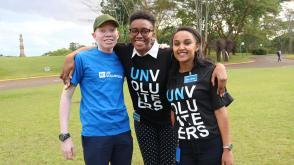Gift Govere is a UN Volunteer deployed under the Talent Programme for Young Professionals with Disabilities, jointly implemented by the UN Development Programme (UNDP) and UNV, and his assignment is part of a project supported by the Federal Ministry for Economic Cooperation and Development (BMZ) of Germany. He supports a multi-stakeholder project in Zimbabwe for women and girls with disabilities. In the current COVID-19 context, Gift is helping UNDP adapt its programming to ensure a disability and gender-inclusive response and shares his experience and perspective.
I was recruited by UNDP in Zimbabwe to provide technical support to the UN Partnership on the Rights of Persons with Disabilities and the Spotlight Initiative on disability-inclusive programming and interventions.
Persons with disabilities are a key constituency in Zimbabwe and constitute about nine per cent of the population. However, they remain invisible at all levels of society and face numerous challenges in accessing health care, jobs, education and justice.
As a person with a disability, mine has been a fulfilling journey working on the frontlines of supporting persons with disabilities, and contributing to a more inclusive society. It is only through inclusion and leaving no one behind that we shall realize a truly prosperous society. --Gift Govere, UN Volunteer with UNDP in Zimbabwe
Women and girls with disabilities are particularly vulnerable to discrimination due to their marginalization. Although the Government of Zimbabwe ratified the UN Convention on the RIghts of Persons with Disabilities in 2013, its implementation is hampered due to an inadequate coordinating mechanism and lacking national strategy or framework for implementation.
It is within this context that key UN entities in Zimbabwe are collaborating on a project to support women and girls with disabilities, namely the UN Educational, Scientific and Cultural Organization (UNESCO), UN Development Programme (UNDP), UN Population Fund (UNFPA), UN Children's Fund (UNICEF), UN Women and the UN Resident Coordinator’s Office. While UNDP, UNESCO and UNFPA implement the project, an advisory group oversees its execution, comprising the government, UNICEF, UN Women and disabled persons organizations.
I support the implementation of the project by drafting work plans, implementation strategies and concept notes, in consultation with partners. I also contribute to research and develop proposals for mainstreaming disability in the implementation of the Sustainable Development Goals (SDGs). Additionally, I support the implementation of projects focused on access to justice and human rights delivery, with a special focus on disability interventions, and document lessons learnt and recommendations to inform current and future strategy and action on disability inclusion.
In the current COVID-19 context, I am supporting UNDP in adapating its programming to ensure a disability and gender-inclusive response. In doing so, UNDP Zimbabwe is informed by the UN Convention on the Rights of Persons with Disabilities, the UN Disability Inclusive Strategy, UN Agenda 2030 on Leaving No One Behind and the recent UN Secretary-General’s policy brief on a disability-inclusive response to COVID-19.
Additionally, under the Spotlight Initiative, I contribute to enabling women and girls to realize their full potential in a violence-free, gender responsive and inclusive society and benefit from adequate legislation and policies, gender-responsive institutions, violence prevention programmes and essential services.
Awareness-raising on COVID-19 for women and girls with disabilities
Women and girls with disabilities are generally a high-risk population due to barriers in accessing preventive information and services. Furthermore, information is usually packaged and disseminated in inaccessible formats and this widens the information gap they face.
Part of my role in the project is to support community engagement and awareness-raising campaigns targeting women and girls with disabilities. These campaigns are critical in addressing their plight in the current COVID-19 context.
With support from the Leonard Cheshire Disability Zimbabwe organization, the first campaign was conducted in Mt Darwin last month, reaching 38 women and girls with disabilities, eight care-givers and local leaders. The activity raised awareness on COVID 19, sensitized the target group on access to justice and gender-based violence services during the pandemic and engaged them in legislative processes.
Access to justice and gender-based violence services during COVID-19
Women and girls with disabilities are significantly disadvantaged in accessing justice. The measures in place to contain the spread of the COVID-19 pandemic have resulted in substantial disruptions to accessing justice and sexual and reproductive health services by marginalized groups. The vulnerability of women and girls with disabilities to gender-based violence has escalated in this context due to pre-existing toxic social norms and gender inequalities, and barriers to accessing pertinent services.
To ensure that people living with disabilities, particularly women, and the organizations that represent them, participate in shaping the laws that directly affect them, there is a need to train them on meaningful participation in policy development.
During one of the project workshops in Mt Darwin, women and girls with disabilities were sensitized on some of the available channels to report cases of gender-based violence and access services. "I had never participated in legislative processes before, because I was not well informed about the process and I didn’t even think my views matter," one of the project workshop participants said.
The Talent and Capacity Development Programme for an Inclusive United Nations System for Persons with Disabilities is a global multi-year action plan of the United Nations Volunteers (UNV) programme. It aims to strengthen the UN system’s capacity to increase institutional knowledge and to advance the rights of persons with disabilities through volunteerism at the global and country levels by including UN Volunteers with disabilities.

